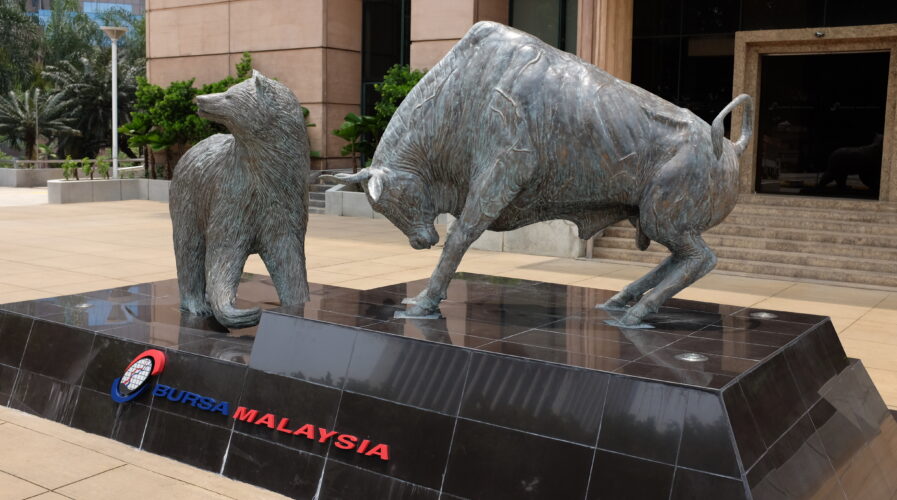
Bursa Malaysia (Source – Shutterstock)
Financial services blockchain making a difference in APAC’s stock exchanges
Financial services around the world have been leveraging new technologies like blockchain to not only meet customer demands but also ensure services are secure, transparent, and traceable.
In the Asia Pacific, blockchain adoption is getting increasingly popular as more industries are realizing its potential and benefits.
Currently, there are already several blockchain use cases in the financial services industry and several other industries. Apart from banks, some manufacturing and logistics companies have also leveraged blockchain to keep track of their supply chain and ensure they have full visibility on it.
What makes blockchain highly sought after in the financial services industry today is its capability as a decentralized distributed ledger.
The concept of decentralization essentially means that data is not held by a single entity, which makes it vulnerable to alterations or deletions without the knowledge of parties involved.
As such, blockchain technology can enable parties who might not necessarily trust each other to validate data in a series of cryptographically linked data structures (called blocks).
With blockchain, every network participant maintains a local copy of the ledger they can independently validate, which in turn, fully distributes and decentralizes trust.
While there are several providers of blockchain services, VMware Blockchain is an enterprise-grade blockchain platform that enables multi-party workflows. It uses advanced techniques such as byzantine fault-tolerant state machine replication, authenticated data structures, and integration with smart contract execution engines to enable customers to build and run decentralized multi-party applications.
To understand more about blockchain-embedded financial services, Tech Wire Asia caught up with Brendon Howe, VMware’s General Manager of Blockchain who explains how the company works with stock exchanges to implement the technology.
According to Brendon, blockchain is used to help transform transaction processes that can enable a multi-party exchange through the use of a decentralized application.

Brendon Howe (IMG/VMware)
“We built a platform that provides unique data sharing capabilities that can reinvent business flow that depends on extensive data sharing methodology. For example, the back-end office for traditional finance and banking, trade, registration, and such have any steps on reconciliation, fulfillment, and clearinghouses that require them to source the truth to reconcile with multiple parties and sharing of information. A data-sharing platform can bring more efficiency and eliminate manual processes,” said Brendon.
For Brendon, the financial services industry is a perfect starting point to show the true value of a product. The exchange industry, for example, witnesses millions of trades per day, making scale and performance crucial. The scale element of the use cases with blockchain plays well to the unique capabilities built.
Using blockchain as a decentralized platform, Brendon pointed out that VMware products in blockchain will be leveraged as well in the environment. He added that unlike the complexities of open-source blockchain, VMware will take full responsibility for the entire solution as a platform. Financial services would only need to focus on their business workflows and not the infrastructure.
“For the financial services, decentralized apps are new app initiatives. There is a reasonable amount of strategy and complexity in reinventing apps, be it business workloads or eliminating steps. It is our job to make the deployment aspect of this tech easy. We deploy on top of vSphere as well as provision and manage the nodes that comprise the ledger network in a matter of hours. It is easier compared to traditional approaches. We see this as the opportunity for customers to deploy and scale easily.”
Blockchain financial services in the stock exchange
Bursa Malaysia Berhad (Bursa) and the Australian Securities Exchange (ASX) are two exchanges in the Asia Pacific that are using blockchain technology. Bursa embarked on a dematerialization proof-of-concept to facilitate the dematerialization of securities certificates leveraging Daml smart contracts from Digital Asset and a highly scalable distributed ledger platform from VMware several months ago. The project aims to test blockchain-powered technologies’ efficiency and operational feasibility in the issuance of dematerialized securities certificates, with initial emphasis on Structured Warrants.
Bursa Malaysia estimates this initiative could improve the ease of doing business by reducing the reliance on manual work to create, manage and withdraw Structured Warrant certificates. The blockchain-powered proof-of-concept will aid in the simplification of Structured Warrants issuances. It provides a centralized source of truth to increase transparency, improve data quality, and reduce potential disruptions in physical transportation and in-person delivery throughout the eligibility life cycle.
In addition, the proof-of-concept employs electronic vaulting technology for data storage and transportation, as well as an e-signature method for digital certificates execution, resulting in improved Structured Warrants eligibility and issuance processing.
Meanwhile, as the world’s first blockchain-based stock exchange, ASX announced intentions to replace their clearinghouse settlement application, CHESS (Clearing House Electronic Subregister System) with a replacement application that is built on a distributed ledger. CHESS is the system used by ASX to record shareholdings and manage the clearing and settlement of equity transactions in Australia. It was world-leading when introduced in the 1990s, providing name-on-register functionality, electronic communications, and removing paper share certificates.
ASX built a new ledger with VMware and Digital Assets and believed there was a business opportunity for them to provide services on that platform which is broader than their traditional business use cases. They formed a new organization called DLT Solutions that is meant to provide ledger as a service for different types of customers within the Australian marketplace.
In the US, Broadridge Financial Solutions also partnered with Digital Asset and VMware to create a fully automated end-to-end repo service that supports the simultaneous settlement of cash and securities, removing risk from the process and significantly decreasing capital costs. The distributed ledger repo platform allows all transaction participants to share one single, real-time view of the entire trade lifecycle with one source of truth that automates repo agreement terms and adheres to market rules.
“A lot of banks and financial services around the world are looking at what ASX and Bursa are doing. This is an industry where the industry is shared and common ways to solve problems differently are looked for. There is a lot of visibility on these early projects. The achievement comes with efficiencies. As applications are reengineered, processes are sped up, costs can be reduced, data sharing models can be expedited for new business opportunities,” added Brendon.
Brendon also believes that the future of blockchain, especially in financial services and other industries is still very much in its early stage. He believes that these new data-sharing models will enable enterprises to see distributed network information that is always trusted and secure.
As Brendon puts it, “It’s a powerful platform that reengineers how businesses run their operations. VMware can take a prominent seat in driving use cases and bringing the tech into the enterprise fold in such a way that we can accelerate a lot of growth.”
READ MORE
- Ethical AI: The renewed importance of safeguarding data and customer privacy in Generative AI applications
- How Japan balances AI-driven opportunities with cybersecurity needs
- Deploying SASE: Benchmarking your approach
- Insurance everywhere all at once: the digital transformation of the APAC insurance industry
- Google parent Alphabet eyes HubSpot: A potential acquisition shaping the future of CRM


